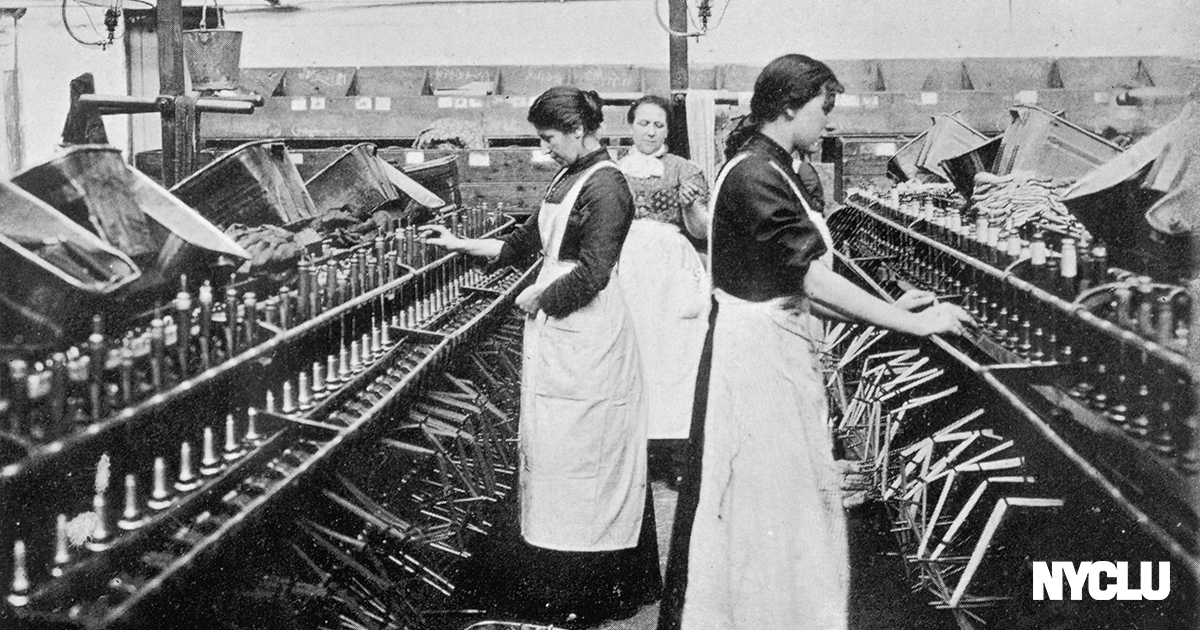110 Years After the Triangle Shirtwaist Fire, NY is Still Exploiting Workers

Lizzie Adler, Yetta Goldstein, Fannie Lansner, Maria Guiseepa Laulette, Santina Salemi, Isabella Tortelli, ….
When it was all over, 146 of the 500 workers at the Triangle Shirtwaist factory lost their lives trapped inside the burning building or plunging to their deaths trying to escape.
Later investigations would reveal that factory owners, hostile to worker grievances and negligent about worker safety, had locked the doors from the outside to prevent possible theft of fabric scraps. Virtually all who perished that day were young, poor, female immigrants.
The Triangle tragedy is often credited with the enactment of the federal labor protections that many workers enjoy today. The right to organize, unemployment compensation, minimum wage, and overtime pay after a 40-hour workweek were all part of Franklin Roosevelt’s New Deal Legislation.
Black people were intentionally left out of the New Deal through its exclusion of the two sectors of the economy where the vast majority of African-Americans worked – agricultural and domestic work. Southern legislators feared that equality for whites and Blacks would disrupt the racist, caste system.
As Representative James Wilcox, a Depression-era Florida Democrat, proudly testified, “There has always been a difference in the wage scale of white and colored labor…. You cannot put the Negro and the white man on the same basis and get away with it.”
Today we have an opportunity to make a new deal to ensure basic labor protections for all New York workers.
One hundred and ten years after the Triangle fire, and over 80 years after the New Deal, New York workers continue to be subjected to exploitation, violence, and neglect because of their race, gender, class, or immigration status.
These workers – many of whom work in the lowest paid and most dangerous jobs – work without sufficient health and safety protections, minimum wage and overtime pay, unemployment benefits, paid family and medical leave, or the right to form a union. They are still waiting to be put “on the same basis” as other workers. New York can and must do better.
There are two bills in the State Legislature that would move us in the right direction.
NY HERO Act
No one should have to choose between their health and their paycheck. Yet one year into the pandemic, essential workers still lack the protection of enforceable health and safety standards for the prevention of Covid and other airborne infectious diseases.
The NY HERO Act would fix this and it would apply not just to full-time staff but independent contractors, domestic workers, day laborers, farmworkers, undocumented workers, and others present at any worksite under a business’s control.
Critically, the legislation also includes a robust anti-retaliation provision to protect workers who speak out about unsafe conditions or attempt to organize in the workplace.
The federal government still has not enacted enforceable workplace safety requirements – with consequences for businesses who don’t follow the rules. That means it’s up to the states to act.
Freedom from Forced Labor Act
The 13th Amendment ended chattel slavery, but with an insidious exception: “as a punishment for a crime.” This means that, for those on the inside, slavery never ended.
From Reconstruction on, the labor of incarcerated Black people has permitted states to fill their coffers by relying on forced, uncompensated labor. First this was accomplished through agricultural labor to replace work previously done by enslaved people. Now it takes place via prison-made goods and convict-leasing partnerships with for-profit businesses.
New York is no exception. Part punishment, part exploitation, the intentional and racist loophole in the 13th Amendment serves as the bedrock of New York’s current penal system. This system is so dependent on human exploitation that, 150 years later, it is akin to modern-day slavery.
Currently, incarcerated people are forced to work under threat of punishment including solitary confinement, delayed parole, or revocation of family visits. Further, since incarcerated people are not considered employees, they are forced to work without standard federal and state employment protections, including minimum wage, paid sick leave, mandatory overtime for unsalaried employees, OSHA protections, or unionization rights.
People in prison work for pennies an hour while the state earns millions of dollars in profits. They are forced to work making furniture for public schools and universities; garbage cans that line New York sidewalks; eyeglasses worn by New Yorkers receiving Medicaid; and even hand sanitizer and coffins during the pandemic.
In the past year of the pandemic, people in prison worked without sufficient PPE protection as the Covid-19 virus spread throughout prisons. To this day, none of the protections deemed so necessary for workers in the New Deal apply to incarcerated people.
The Freedom from Forced Labor Act would amend the Department of Corrections law to prohibit forced labor in New York’s prisons and jails. It would also amend the New York Constitution to remove its slave labor exception.
Over a century ago, New Yorkers watched a tragedy unfold, which catalyzed a new era in workers’ rights. But some workers were kept behind. Today we have an opportunity to make a new deal to ensure basic labor protections for all New York workers.
